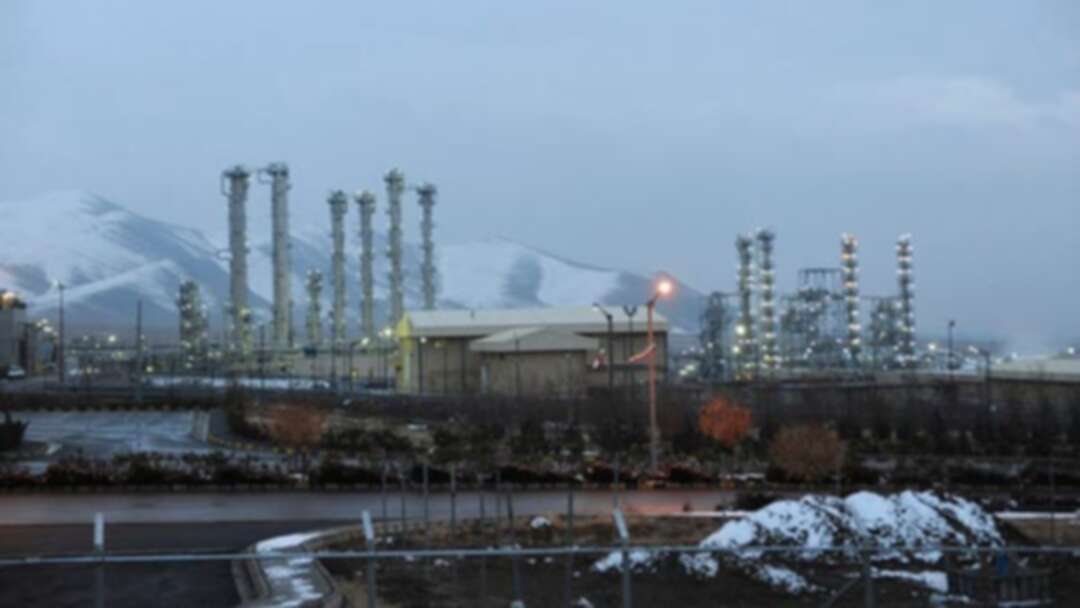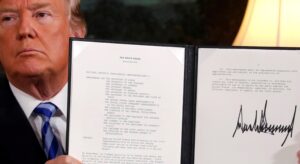-
Iran possibly close to enough material for a nuclear bomb: US Secretary of State

Iran is months, or possibly even weeks, from being able to build a nuclear weapon, according to US Secretary of State Antony Blinken in his first televised interview since he took office.
In an interview with NBC News’ Andrea Mitchell, Blinken said Iran was months away from being a nuclear threat.
“It is a problem that could get more acute because if Iran continues to lift some of the restrains imposed by the agreement, that could get down to a matter weeks,” he said.
“The bottom line is they are getting closer to the point where they would either be a threshold nuclear power - or actually a nuclear power.”
After Donald Trump pulled the US from the nuclear accord with Iran and imposed crippling sanctions in 2018 as part of a “maximum pressure” campaign, Tehran began enriching uranium to levels that exceed allowed limits.
 U.S. President Donald Trump holds up a proclamation declaring his intention to withdraw from the JCPOA Iran nuclear agreement after signing it in the Diplomatic Room at the White House in Washington, U.S. May 8, 2018. (Reuters)
U.S. President Donald Trump holds up a proclamation declaring his intention to withdraw from the JCPOA Iran nuclear agreement after signing it in the Diplomatic Room at the White House in Washington, U.S. May 8, 2018. (Reuters)Iran said the US has to remove key economic sanctions and return to full compliance with the 2015 nuclear deal before any talks on resetting Tehran’s atomic program.
US President Joe Biden has pledged to rejoin the deal if Iran returns to complying with it.
The US “cannot return to the nuclear accord with one signature in the way that they left with one,” Foreign Ministry spokesman Saeed Khatibzadeh said in a press conference in Tehran on Monday.
The statement is a clear signal to the Biden administration that Iran expects relief from sanctions, and the full restoration of the United Nations resolution that underpins the deal before it starts scaling back its nuclear activities. It also illustrates the major gulf between the longtime rivals.
Last week, Blinken said Iran needs to act first and any US return to the accord may take a while.
“We’re waiting for US action to effectively undo sanctions, give us access to our own funds, permit easy oil exports and allow the transfer of oil revenue, shipping and insurance,” Khatibzadeh told reporters, referring to billions of dollars of payments for oil exports that are trapped overseas because of banking sanctions.
Khatibzadeh said there won’t be any direct bilateral talks with the US until it first returns to the original bloc of six powers that brokered the accord. Washington can then join discussions over Iran’s nuclear work but within the existing mechanism that’s outlined within the Joint Comprehensive Plan of Action.
The stalemate raises questions over whether the crisis can be resolved before the Islamic Republic hits a deadline later this month to secure sanctions removal, or else end voluntary international nuclear inspections. Moderates in Iran are also hoping for a boost from the lifting of some sanctions ahead of presidential elections set for June.
source: Jennifer Bell
Image source: AP
Levant
You May Also Like
Popular Posts
Caricature
BENEFIT Sponsors BuildHer...
- April 23, 2025
BENEFIT, the Kingdom’s innovator and leading company in Fintech and electronic financial transactions service, has sponsored the BuildHer CityHack 2025 Hackathon, a two-day event spearheaded by the College of Engineering and Technology at the Royal University for Women (RUW).
Aimed at secondary school students, the event brought together a distinguished group of academic professionals and technology experts to mentor and inspire young participants.
More than 100 high school students from across the Kingdom of Bahrain took part in the hackathon, which featured an intensive programme of training workshops and hands-on sessions. These activities were tailored to enhance participants’ critical thinking, collaborative problem-solving, and team-building capabilities, while also encouraging the development of practical and sustainable solutions to contemporary challenges using modern technological tools.
BENEFIT’s Chief Executive Mr. Abdulwahed AlJanahi, commented: “Our support for this educational hackathon reflects our long-term strategic vision to nurture the talents of emerging national youth and empower the next generation of accomplished female leaders in technology. By fostering creativity and innovation, we aim to contribute meaningfully to Bahrain’s comprehensive development goals and align with the aspirations outlined in the Kingdom’s Vision 2030—an ambition in which BENEFIT plays a central role.”
Professor Riyadh Yousif Hamzah, President of the Royal University for Women, commented: “This initiative reflects our commitment to advancing women in STEM fields. We're cultivating a generation of creative, solution-driven female leaders who will drive national development. Our partnership with BENEFIT exemplifies the powerful synergy between academia and private sector in supporting educational innovation.”
Hanan Abdulla Hasan, Senior Manager, PR & Communication at BENEFIT, said: “We are honoured to collaborate with RUW in supporting this remarkable technology-focused event. It highlights our commitment to social responsibility, and our ongoing efforts to enhance the digital and innovation capabilities of young Bahraini women and foster their ability to harness technological tools in the service of a smarter, more sustainable future.”
For his part, Dr. Humam ElAgha, Acting Dean of the College of Engineering and Technology at the University, said: “BuildHer CityHack 2025 embodies our hands-on approach to education. By tackling real-world problems through creative thinking and sustainable solutions, we're preparing women to thrive in the knowledge economy – a cornerstone of the University's vision.”
opinion
Report
ads
Newsletter
Subscribe to our mailing list to get the new updates!






















